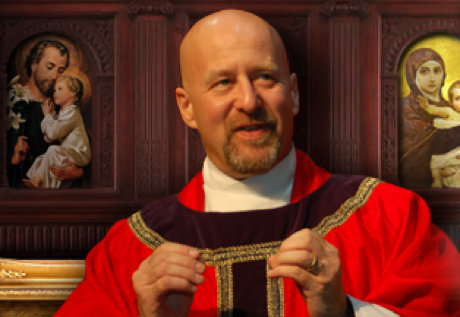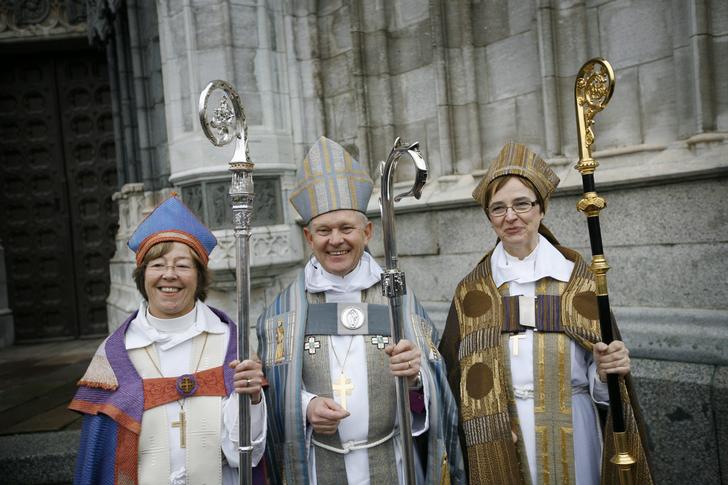
-by Fr. Dwight Longenecker, a former Evangelical Protestant, graduate of Bob Jones University, turned Anglican priest, turned Catholic priest.
“The ecumenical teams for Lutherans and Catholics have been hard at it and produced a new document on Church, Eucharist and Ministry called Declaration on the Way.
It’s all full of enthusiastic and optimistic language about how Lutherans and Catholics are all starting to agree after 500 years.
I hate to be a party pooper, but like the ecumenical talks with the Anglicans, it seems to me that we are further apart than ever before on some very key issues and that on these issues which are so divisive we are on ever widening tangents.
You remember Chesterton’s observation, “When two paths begin to diverge the gap between them always widens.”
The language of these ecumenical documents is always very elastic. The participants efforts to agree are laudable. We all want church unity, but too often they seem to be straining at gnats and swallowing camels.
In order to find “points of convergence” the dialogue masters find minor points of agreement, pump them up and then deflate the larger and more important points of disagreement that remain.
My other grumble about this sort of thing is that the language, in an attempt to be diplomatic and find points of agreement is invariably ambiguous, vague and deliberately confusing, and where it is not all this it is contradictory and illogical.
The attempts to find points of convergence must be balanced with a clear understanding of the truth. (Ed. PLEASE! PLEASE! PLEASE! DO NOT confuse consensus with Truth! If everyone agrees, that does not make it TRUE! And, if everyone disagrees that does not make it untrue!) We must agree on the truth (not really, I take Fr Longnecker’s point here clearly, but as I just said, the Truth is the Truth, More is not Better, often, Better is Better, always, whether we like it, dislike it, agree with it or not, hence the definition of the word Truth = Veritas,”Moral principles do not depend on a majority vote. Wrong is wrong, even if everybody is wrong. Right is right, even if nobody is right.” Venerable Servant of God Archbishop Fulton J. Sheen), not agree on some vague re-formulation of “belief statements.” (This is why classical Christianity has a CREED!!!! Every syllable of which has had wars fought over it!!! Every syllable of which has had much blood spilled over it!! Perhaps I dramatize a little, but not THAT much!)
Here’s an example in a passage about women’s ordination for example. Fr Longnecker’s comments are in BOLD.
“Most Lutheran member churches of the LWF hold themselves free under the gospel to ordain women. Why is that? They see in this practice “a renewed understanding of the biblical witness” which reflects “the nature of the church as a sign of our reconciliation and unity in Christ through baptism across the divides of ethnicity, social status and gender” OK. They’re going to change the ordained ministry and admit women. (Lund Statement, § 40). At the same time, “it can be said that in general the Lutheran churches which have introduced the ordination of women do not intend a change of either the dogmatic understanding or the exercise of the ministerial office” (Ministry, § 25).OK We’ve changed the understanding of the ordained ministry but we do not intend to change the understanding of the ordained ministry. Significantly, churches in the LWF that do ordain women and those that do not have remained in communion with one another.
The Catholic Church does not consider itself as authorized to ordain women. Nevertheless, in The Ministry in the Church the international dialogue commission affirmed that the Catholic Church “is able to strive for a consensus on the nature and significance of the ministry without the different conceptions of the persons to be ordained fundamentally endangering such a consensus and its practical consequences for the growing unity of the church” (§ 25). This is gobbledegook. So the Catholics also want to have their cake and eat it. We are not going to ordain women but we think ordaining women doesn’t really matter. Really?”
Most worrying about this starry eyed optimism is the head in the sand attitude of those involved in the dialogue. Both the Catholics and Lutherans involved seem blind to the fact that most Lutherans don’t give two hoots about unity with the Catholics.
They’re like the Anglicans.
I can remember when I was an Anglican seminarian and found myself debating women’s ordination with a female theology student.
I said, “But women’s ordination will present a serious obstacle in the path to unity with Catholics.”
“Good God!” she exclaimed, “I don’t want to be a Catholic! What on earth do we want unity with them for?”
Whenever one of these documents from the ecumenicists came back to the Church of England General Synod it was invariably shot down–not by the Catholics, but by the Anglicans. When I was a priest in the Church of England the ARCIC folks came back all warm and fuzzy with a document about Eucharist, Ministry and Church. Oh, there was so much agreement! There were so many “points of convergence.” Then when it went to the CofE General Synod for approval it crashed and burned. Both the liberals who hate the Catholic Church for being so conservative and the Evangelicals who hate the Catholic Church for being Catholic shot it full of holes and it died a quiet and dignified death.
The worst thing about this document is the recommendation that Catholics and Lutherans perhaps should begin receiving communion together (Intercommunion, General Prohibition Concerning, Canon 844). “It suggests that the expansion of opportunities for Catholics and Lutherans to receive Holy Communion together would be a sign of the agreements already reached and the distance traveled.”
When speaking about intercommunion I often say being in communion with the Catholic Church is like being married. You either are or you are not. If you are you can make love together if you are not you shouldn’t. To do so is either fornication or adultery. (THINK about the word!! INTERCOMMUNION, to be in UNION within! As a visible sign! Tangible act! Finally, more than just WORDS! VERY, VERY PUBLIC ACT & WITNESS!!! And, there are now witnesses to your very, very public act and witness of affirmation of union within another denomination, affirming ALL THEY hold and believe to be True!!! Now, answer the question whether you should receive outside your denomination? Intercommune? Are YOU, PLURAL, NOT SINGULAR!!!, as a member or your union, your denomination, in UNION? Within? Do you hold and believe to be True ALL this other union holds to be true? Do you even understand ALL this other union holds to believe to be true? This is the GRAVE & SOLEMN statement you give whenever you receive communion!!! Whenever!!!! Appreciate THIS the next time and every time thereafter you are in line to receive!!!! LORD, MAKE ME WORTHY!!!!! ONLY GOD CAN!!!) 🙂
To extend the analogy, for Lutherans and Catholics to start sharing communion before full unity has been achieved is a bit like saying, “Bob and Sally have had a wonderful vacation together, so they should wind up their fun time by jumping in the sack together.”
In other words, “Let’s celebrate full communion while we do not have full communion.” (HERESY!! HERESY!! HERESY!! “Hello? Inquisition? Come, right away!! I’d like to report…”)
Once we cut through all the obfuscation, diplomatic double talk and intellectual mumbo jumbo that’s what it comes down to.
One final note: I can remember as an Anglican reading in the gospel that Christ called for their to be one flock and one shepherd.
I asked myself what I could do to help promote church unity and I realized that there was one, solid, sure and positive thing I, as one Christian, could do to bring about church unity.
I could become a Catholic.
So I did.”
Love,
Matthew

